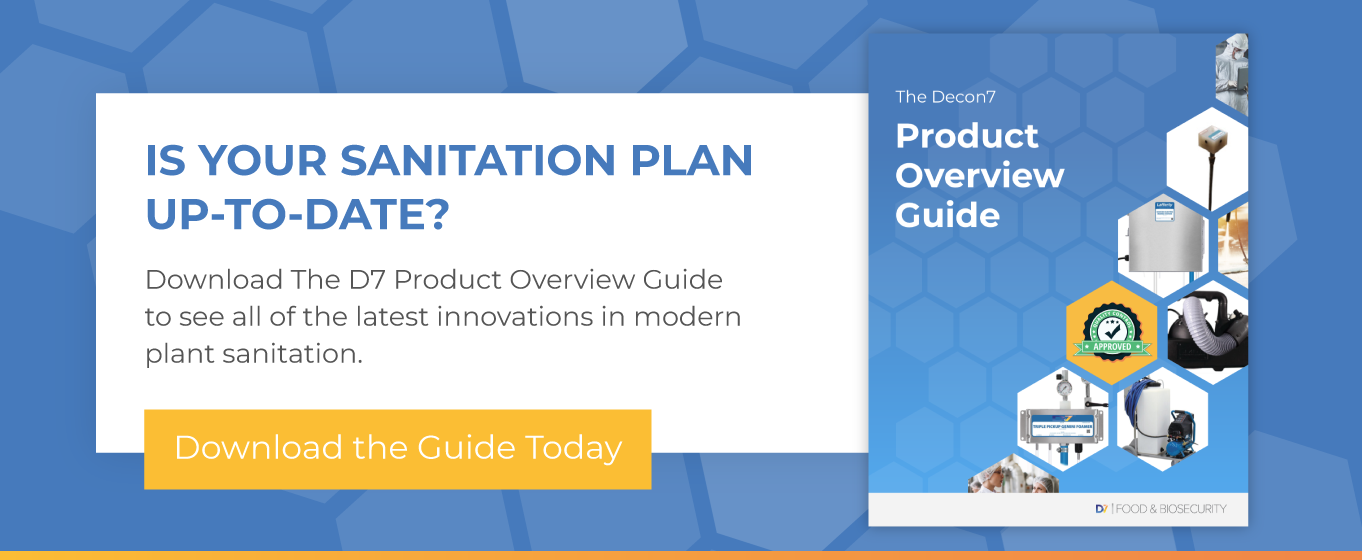One of the amazing aspects of life on earth is the ability for organisms to adapt to their surroundings, sometimes through mutations that change the way they handle external threats. Although this is scientifically fascinating, from a food safety perspective, when bacteria adapt to become resistant to the chemicals used to kill them, it presents a potential health risk because it makes the sanitizing products food processors use less effective.
If one of your goals as a food safety professional is to avoid an outbreak in 2020, understanding how bacteria mutate—and how you can prevent it from happening—will contribute to your success.
Mutation and Bacterial Resistance
When bacteria multiply, there is a chance that a mutation will occur either randomly or in response to the surrounding environment. In the presence of sanitizing chemicals, bacteria can adapt to become more resistant. These mutated cells will multiply more rapidly than others because of natural selection, and they then have a greater chance of survival because of their resistance to a certain chemical. Continuing to use only that chemical contributes to the natural selection process and eventually allows the mutated bacteria to thrive.
Rotating the types of chemicals used for sanitizing is an industry standard for reducing the risk of mutation, but it is not the only approach. Using a product that doesn’t lead to mutation in the first place is a smart way to keep bacteria at safe levels without contributing to potential mutation and bacterial resistance.
How D7 Addresses Mutation
Bacterial resistance to sanitizers becomes less of an issue when the sanitizing chemical kills bacteria at the DNA level. Destroying the DNA prevents the cell from being able to reproduce and mutate. D7 is able to penetrate cell walls to reach the genes in the nucleus because the chemical formulation softens cell walls and allows the active agents to enter the cell and destroy the genetic material inside. Including D7 in the regular rotation of sanitizing can help reduce the risk of bacterial resistance, which will contribute to your goal of preventing an outbreak in 2020.
Prevention vs. Reaction in 2020
No company wants to deal with an outbreak, regardless of how it happened. Reacting to an outbreak is costly, both to the bottom line and to the brand. In addition to the costs related to deep cleaning a facility to remove the source of the outbreak, you might also have to fund a recall, hire consultants, and absorb the costs of lost production time. Brand damage that leads to lower future sales is also a risk that food processors want to avoid because of the lasting financial effects.
Prevention is critical for continually reducing bacteria to safe levels, including those that have mutated to become more resistant. Daily sanitizing and periodic deep cleans will help keep bacteria at bay and prevent the formation of biofilms. D7 also helps reduce the risk of mutation that leads to bacterial resistance, making it an important tool in your arsenal against outbreaks.
The Costs of Prevention Are Justifiable
A strong focus on prevention might feel like a big investment, but compared to the outcomes of an outbreak, it is time and money well spent. Fortunately, you don’t have to come up with solutions on your own. When you work with the trusted professionals at Decon7, we will help ensure that your sanitizing protocols, training programs, and support materials are all designed to help you prevent an outbreak in your facility. We’ll learn more about what you need during an onsite visit and then work closely with you to determine the best path forward. To get started, request a consultation today.

